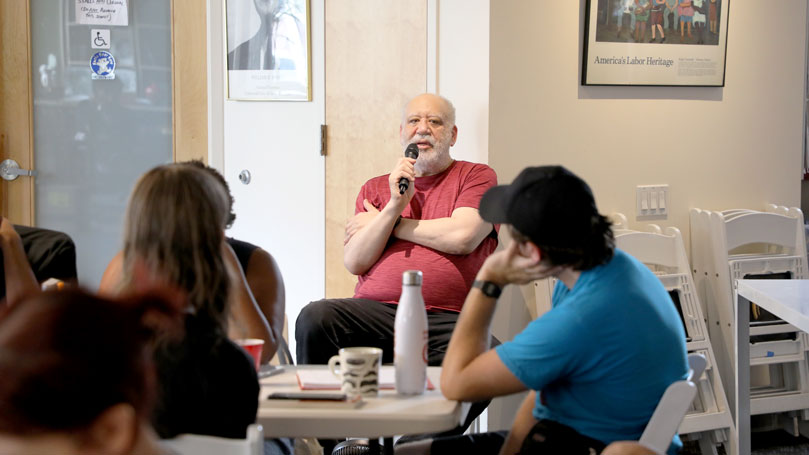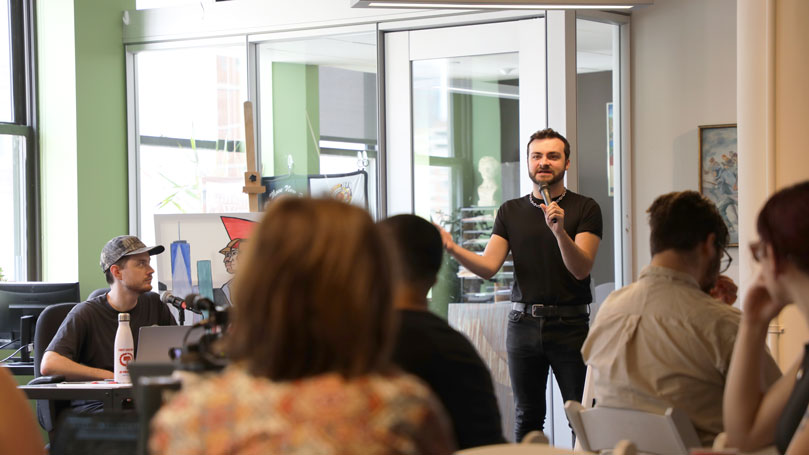
This article was written in conjunction with Mental Health for Activists, an activity of the Working-Class Project. The Working-Class Project functions under the initiative of the CPUSA National Education Commission. Here is a related article: Subjectivity and comradely discussion: strengthening our collectivity.
Our goal is to understand the world, and ourselves as human beings within it. We have the purpose of working together as collectives to change our society and world to respond more favorably to our needs and wants as working-class people, toward achieving socialism. We want to be free of the exploitation and oppression of capitalism. We have come to understand that there is objective reality, which is the world around us, and subjective reality, which includes our thoughts and emotions in reaction to our perception of, and experiences within, the world. Strengthening the ability of our collectives to function directly impacts our ability to work successfully toward achieving our goals.
Here, we want to stay focused on how we can immediately take steps to improve the functioning of our collectives, which is dependent on the behaviors we bring to the table. At another time, we can explore the concept of objectivity and subjectivity as a unity of opposites: a contradiction. We can explore other related aspects of the philosophy of Marxism, i.e. dialectical materialism. Developing a deeper understanding of the process of change helps us to better grasp the various aspects of what we are doing and how to produce the change we seek.
The bad news is we each come to the table carrying the baggage of the influence of capitalist culture intermingled with our own individual strengths and weaknesses. The good news is we can work to reduce the influence of that baggage. We can consciously embrace the best of working-class culture and characteristics which have a proven track record in history as healthy toward producing our desired results in the workplace and the community. We can learn how to manage our weaknesses and be mindful of the kind of behavior we bring to the collective table. We can aid the functioning of our collectives by consciously working within our ranks to reduce the influence of the culture and characteristics of big and small capital and increase the embrace of the best of the culture and characteristics of the multi-racial, multi-gender working-class.
Leadership is required to help facilitate the functioning of our collectives. Leadership is required to model the behavior needed to move forward in the face of many challenges. Leadership is required within our collectives to emulate the best of the culture and characteristics of the working-class in a manner which is productive. Please note, this too is an aspect of the class struggle. Egoistic individualism, competitiveness, and the prosperity of the lone individual are not working-class characteristics; those are the characteristics of the classes of capital. Collectivity, cooperation, and concern for the well-being of our working-class communities — and not just our lone selves — are healthy characteristics of the working-class. We seek to consciously work to cultivate the dominance of working-class characteristics in our collectives. In our collectives, we also struggle for the utilization of a scientific approach in mapping the way forward. This, in part, is why we emphasize the role of leadership relative to the wider membership as well as democratic centralism. A scientific approach enables us to work to grasp how objective and subjective factors can influence our ability to bring into being within our environment the embryo of the new society for which we are fighting.
Communist maturity requires cultivating the ability to pause and do something different than just react based on our subjective impulse.
The objective and the subjective are interrelated and intertwined, each having the ability to influence our behavior. The subjective is most immediate in our awareness. We have an experience, and we immediately sense thoughts and feelings in reaction. A problem can emerge if we allow our subjective reaction alone to guide our behavior. Communist maturity requires cultivating the ability to pause and do something different than just react based on our subjective impulse. Communist maturity requires that we access an alternative.
Our subjective impulse is very personal, individual, and egocentric. Our subjective impulse sits atop what are sometimes fierce emotions and thoughts, which can instigate behaviors that will not facilitate productive communication and activity. Our subjective impulse can stimulate varying degrees of anger. Our perceptions within the subjective sphere are limited, narrow, bound, small, and self-centered. Subjectivity is not adequately reflective of the world which exists independent of our individual thoughts and feelings.

The subjective sphere encourages us to see ourselves as the center of the universe, influences us to digest everything through a personal lens, and dictates that we engage in egoistic, reactive behaviors. The objective sphere reminds us there is a world which exists beyond ourselves, that we are human beings among many in the struggle to change the world, and that the most important effort is to decipher a doable next step to move our work forward. Even if there is an intentional provocation, we don’t have to take the bait and fall into the trap. It’s easier said than done and a challenge to sustain, but this aspect of struggle introduces us to a freedom which is truly worth coming to know and beneficial to our work. All opinions within the collective should be heard, and leadership forces should get a sense of where and how the collective can seek to advance. Reaching for the objective enables us to allow our subjective impulses to fall back, and through this process we can access behaviors which will be more useful and helpful to our work.
We do not have to engage in behavior based on our subjective impulses. But to do something different, we have to engage in a conscious, consistent internal battle as we engage with others. As a matter of fact, it is unwise to act on our subjective impulses. Our subjective reactions may be fully understandable, but the question is if our subjective reactions will help move us forward or keep our collectives stuck in an unproductive, debilitating cycle of interpersonal conflict. We can engage in something else, a different kind of behavioral response, if we know and consciously practice what that something else is. Especially when we feel the internal fire of emotions and thoughts of interpersonal conflict, even in the slightest, we can train ourselves to pause, to stop, and to let ourselves feel what we are feeling and think what we are thinking without allowing these impulses to elevate to active behavior. Before we engage in active behavior, we can pull from something else beyond our subjective impulse to broaden our perception and enable a more grounded guide. That something else is the objective sphere, which exists independent of what we feel and what we think as individuals.
If we allow our thoughts and feelings to calm, which may take minutes, hours, or even days, depending on how intense a subjective impulse is ignited, we can utilize consciousness to access the objective sphere. Within the objective sphere, we can work to decipher what will be helpful to move the processes of social change, on the concrete levels in which we are engaging, forward; we can decipher what will advance our work. We can help ourselves to mold our behavior to be consistent with achieving the more objective desired result. Even when instigated by the purposeful, egocentric negative behaviors of others, we can successfully answer the question: “What is the contribution I can make in this moment to help move our efforts forward, instead of digressing into bitter bickering?”
Some of our own egocentric motivations can pollute the process of using the perception of objective reality to guide our behavior. Some egocentric motivations can include the pursuit of superiority over others, domination over others, sexual predation or manipulation of others, and jealousy or envy for various reasons. Some egocentric motivations can be infused with racism and white supremacy, male supremacy and misogyny, anti-working-class attitudes and orientations, anti-communism, or an internalized reaction to any or all these influences of big and small capital.
What we are discussing is a foundational aspect of communist maturity. We need to engage in the unending process of strengthening our ability to display Communist maturity — not as a pretense to hide attempts at manipulation and passive aggression — as the real effort to upgrade our development and evolution. It is also necessary that we learn how to share this alternative with others based more on what they see us do, rather than just what they hear us say. Communist maturity strengthens our ability to build and work collectively.
We must remember that our collectives and collectivity are our superpowers. However, our collective work is not the only beneficiary. Ultimately, we as individuals gain conscious control over where we put our energy and attention and where we withdraw our energy and attention. Therein is a freedom from the domination and control of subjective reactive impulses we all deserve to come to know and experience, because this will be helpful in every aspect of our lives. Again, it is easier said than done, but the extent to which we consciously and consistently make the effort is the extent to which the desired results will manifest.
The opinions of the author do not necessarily reflect the positions of the CPUSA.
Images: People’s World / Flickr


 Join Now
Join Now